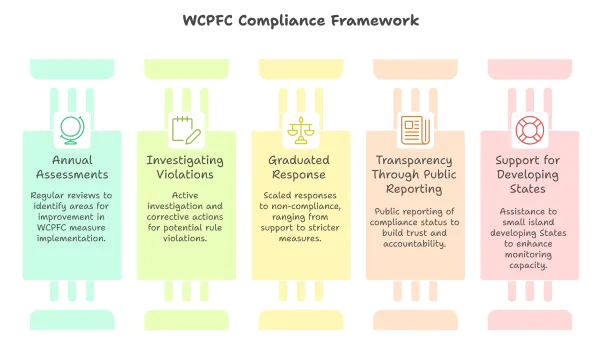The Compliance Monitoring Scheme (CMS) was first introduced as a trial to monitor how well Members, Cooperating Non-Members and Participating Territories (CCMs) comply with WCPFC rules. Since then, the CMS has undergone several Member-led reviews and updates, including through intersessional work and the TCC, to improve and streamline its processes. An Independent Panel reviewed the CMS in 2017 and provided practical recommendations to enhance implementation. The Secretariat has also continued to support ongoing improvements, including the development of online tools.
The current CMS framework is set out in conservation and management measure CMM 2023-04, adopted in December 2023 and valid through 31 December 2026. The Commission remains committed to a multi-year workplan to further strengthen the CMS and make it more efficient and effective.
What is the purpose of the CMS?
The purpose of the CMS Scheme is to ensure that CCMs implement and comply with obligations arising under the Convention and conservation and management measures (CMMs) adopted by the Commission. The purpose of the CMS is also to assess flag CCM action in relation to alleged violations by its vessels, not to assess compliance by individual vessels. The CMS is designed to:
- assess CCMs’ compliance with their WCPFC obligations.
- identify areas in which technical assistance or capacity building may be needed to assist CCMs to attain compliance.
- identify aspects of CMMs which may require refinement or amendment for effective implementation.
- respond to non-compliance by CCMs through remedial and/or preventative options that include a range of possible responses that take account of the reason for and degree, the severity, consequences and frequency of non-compliance, as may be necessary and appropriate to promote compliance with CMMs and other Commission obligations (footnote 1. In accordance with the process for identifying corrective action, as provided for in paragraph 46(iv).)
- monitor and resolve outstanding instances of non-compliance by CCMs with their WCPFC obligations.

The implementation of the CMS and its associated processes shall be conducted in accordance with the following principles for the purpose of the application of this measure:
- Effectiveness: Effectively serve the purpose of this CMM to assess compliance by CCMs and assist the TCC in fulfilling the provisions of Article 14(1)(b) of the Convention.
- Efficiency: Avoid unnecessary administrative burden or costs on CCMs, the Commission or the Secretariat and assist TCC in identifying and recommending removal of duplicative reporting obligations.
- Fairness: Promote fairness, including by: ensuring that obligations and performance expectations are clearly specified, that assessments are undertaken consistently and based on a factual assessment of available information and that CCMs are given the opportunity to participate in the process.
- Cooperation towards Compliance: Promote a supportive, collaborative, and non-adversarial approach where possible, with the aim of ensuring long-term compliance, including considering capacity assistance needs or other quality improvement and corrective action.
How does the CMS work?

- Annual Assessments: Each member's implementation of WCPFC measures is reviewed every year. This regular assessment helps identify any areas where improvements are needed.
- Investigating Violations: Members are required to actively investigate and address any potential rule violations. This means they must look into incidents and take corrective actions when necessary.
- Graduated Response: The response to non-compliance is scaled based on the severity of the issue. For minor infractions or where a member needs help, capacity building support is provided. For more serious or repeated violations, stricter responses may be imposed.
- Transparency Through Public Reporting: The final Compliance status for each member is reported publicly after all data is checked for quality and accuracy, creating transparency and accountability. This openness helps build trust among members and encourages adherence to the rules.
- Support for Developing States: Special assistance is offered to small island developing States and territories to help them build their monitoring capacity. This ensures that all members, regardless of their current resources, can fully implement and comply with WCPFC measures.
In essence, the WCPFC’s compliance monitoring scheme not only enforces the rules but also focuses on strengthening the capabilities of its members, ensuring sustainable fisheries management across the region.
Visit Monitoring and Evaluation: Incorporating Conservation and Management Measures to explore WCPFC obligations in more detail, including audit points, fishing limits, and the risk based assessment framework.
Important information for CCMs
WCPFC reporting deadlines and key dates
Reporting deadlines and key dates are maintained within the WCPFC website calendar, and may be accessed as an ICAL link and CSV export through the "Upcoming Events" Calendar page here.
In addition, authorised CCM users now have a Reporting Dashboard on the Monitoring and Evaluation incorporating CMM webpage. The Reporting Dashboard displays information and links to annual reporting requirements, including ARPt2 and frequently used WCPFC website pages or systems.
Authorised CCM users can access additional information through the Secure CCM Portal.